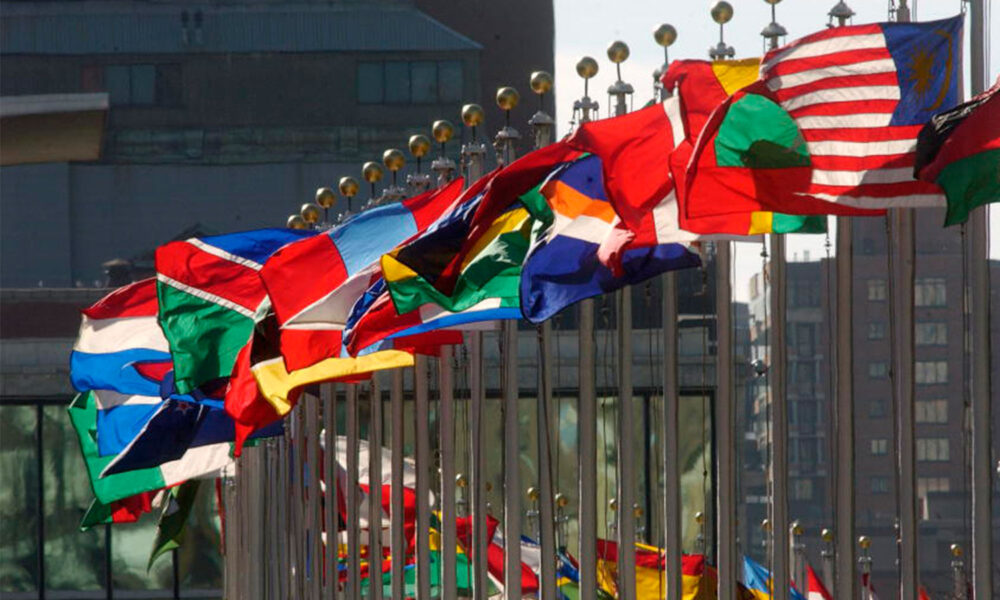To ring in 2022, the leaders of the five permanent members of the UN Security Council – China, France, Russia, the United Kingdom and the United States, also known at the P5 — pledged that they will, to the best of their abilities, avoid a nuclear war.
It should be good news that five major nuclear powers have reaffirmed the Reagan-Gorbachev principle that “a nuclear war cannot be won and must never be fought.” But, with international temperatures rising over Ukraine and elsewhere, this pledge seems ominous rather than reassuring, a reminder that, without diplomacy and action, war between nuclear powers remains a growing risk.
The good news is that humanity has gotten itself out of this mess before, so we know that there is much more that the world’s nuclear powers can and must do to reduce nuclear risks. The dangers we face today are no excuse for inaction.
Europe approaching the brink of war
As the P5 statement was published, roughly 100,000 Russian troops had gathered at the border of Ukraine along with everything needed to support an invasion, from armored vehicles to field hospitals. Ukraine is preparing for war – in fact, has been at war since 2014, when Russia first invaded the eastern part of the country and occupied Crimea. The United States is telling its allies that a new Russian invasion of Ukraine may be imminent; both the United States and other NATO members have pledged to respond to further Russian aggression in Ukraine, warning Russia of the consequences of such an act. The head of UK armed forces stated that, should Russia strike into the heart of Ukraine, it would mean violence “on a scale not seen in Europe since the Second World War.”
A conventional war in Ukraine would be devastating. It also risks escalation to the use of weapons of mass destruction. Whether to stir nationalist anger or to justify future military actions, the Russian Defense Minister has begun voicing unsubstantiated accusations that the United States is preparing to use chemical weapons against Russian troops in Eastern Ukraine. Nuclear saber-rattling has also begun: in the final weeks of 2021, Russia sent nuclear-capable bombers to patrol the skies over Belarus.
Unfortunately, the situation in Ukraine is not the only source of tension among nuclear powers. Nuclear weapons states – including the United States – are increasing, rather than decreasing, their nuclear capabilities. China is laying the groundwork for a major expansion of the size and diversity of its nuclear forces. Although the Chinese arsenal is still far smaller than the nuclear arsenals of the United States and Russia and will remain so for the foreseeable future, fears about the activities of US adversaries are being used to support astronomical spending on nuclear weapons in the United States as well. In his first budget request, President Biden asked for more money for nuclear weapons than his predecessor despite Biden’s campaign pledges to reduce US reliance on nuclear weapons.
Statement is an inadequate offering for troubled NPT conference
The statement on the importance of preventing nuclear war was not related to the escalating crisis in Ukraine; the timing was coincidental. Even a brief statement from all five permanent members of the UN Security Council often requires months of diplomatic engagement. This particular statement was constructed to be an offering for the (now postponed) review conference of the Nuclear Non-Proliferation Treaty (NPT), the most important international treaty for limiting the spread of nuclear weapons.
The NPT is built on a grand bargain: non-nuclear weapons states agree that they will not pursue nuclear weapons, and the five recognized nuclear weapons states agree to pursue nuclear disarmament “in good faith” while sharing the advantages of peaceful nuclear technologies. Every five years, the review conference of the NPT provides a vital global forum for the 191 state members to evaluate progress towards disarmament and plan actions to make the world safer from nuclear conflict. Unfortunately, the last review conference failed to produce any consensus agreement, and the 2020 conference has been repeatedly delayed due to the ongoing global pandemic.
There is little reason to hope for a better outcome for the forthcoming NPT review conference when it finally happens. Since 2015, little meaningful progress has been made on disarmament – in fact, the world seems to be moving in the opposite direction towards a new arms race. There is a new source of conflict between the nuclear weapons states and many non-nuclear weapons states over the Treaty on the Prohibition of Nuclear Weapons, aka the nuclear ban treaty. The nuclear ban treaty entered into force in January 2021 but has been boycotted by all nuclear powers. It remains to be seen how the issue of the nuclear ban treaty will be addressed within the framework of the NPT.
In the context of the challenges facing the NPT regime, the P5 statement is a disappointing offering. It outlines no path forward to progress and offers little for those who fear that the actions of the nuclear powers are bringing the world closer to, not farther from, nuclear war.
A dangerous world needs disarmament more, not less
The nuclear weapons states explained their opposition to the nuclear ban treaty by arguing that a comprehensive disarmament effort fails to “[take] into account the international security environment.” Echoing this language, the North Atlantic Council has repeatedly stated that the nuclear ban treaty “does not reflect the increasingly challenging international security environment.” When the nuclear powers are pressed to explain why they have made so little headway in their obligation to pursue nuclear disarmament, they will doubtless cite the deteriorating global security environment.
But the dangerous security environment we live in today puts more urgency on nuclear disarmament, not less. The greatest achievements in nonproliferation and disarmament diplomacy happened during the Cold War and required close cooperation between the United States and the Soviet Union; treaties like the Nuclear Non-Proliferation Treaty were propelled forward by the Cuban Missile Crisis; arms control agreements restrained the nuclear arms race at its height; the Reagan-Gorbachav principle reaffirmed in the P5 statement was first uttered in 1986, following one of the most dangerous periods of the Cold War.
It is welcome that the P5 agree that nuclear war must be prevented. But the statement is nevertheless unsettling for what it does not contain: any answer for the spiraling global conflicts that could lead to nuclear war; any path away from the nuclear arms race under way; any action that can bring the world closer to nuclear disarmament. Ultimately, the only way to prevent nuclear war is to eliminate nuclear weapons. Words – even well-intentioned – are not adequate to prevent disaster. What the world needs is action.

